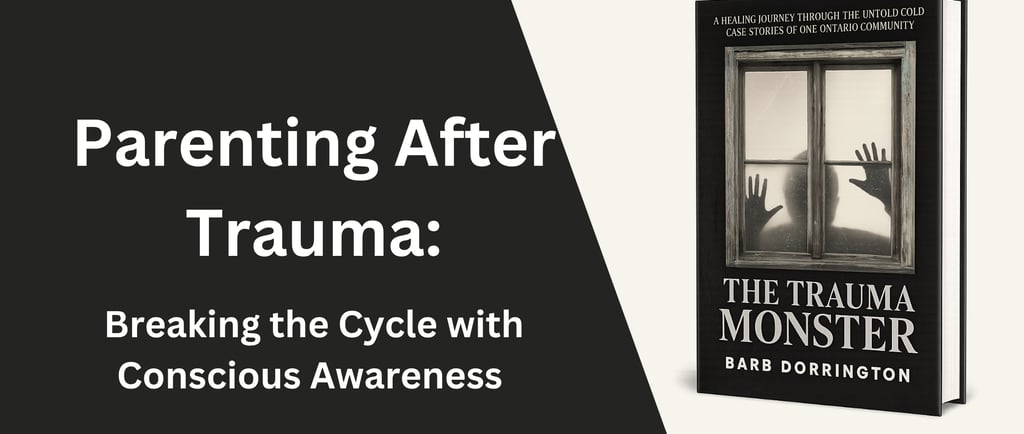Parenting After Trauma: Breaking the Cycle with Conscious Awareness
Barb Dorrington
8/4/20252 min read


Parenting is one of the most rewarding—and most demanding—roles a person can take on. But for those who carry unresolved trauma, parenting can stir up old wounds, insecurities, and fears. In her compassionate guide The Trauma Monster, Barb Dorrington explores how trauma survivors can navigate parenting not just to raise healthy children—but to heal themselves in the process.
The truth is, trauma doesn’t just affect the past. It shapes how we show up in the present. And it often shows up uninvited in our parenting.
How Trauma Manifests in Parenting
Emotional Reactivity: Small misbehaviors trigger big reactions—often rooted in your own childhood experiences, not your child’s actions.
Overprotection: You may become hypervigilant, trying to prevent any harm—especially the kind you endured.
Disconnection: Some trauma survivors feel emotionally numb, making it difficult to bond or respond with sensitivity.
Guilt and Shame: You may constantly second-guess yourself or feel like you're not good enough, despite your efforts.
These responses are not flaws. They are survival strategies formed in moments when you had to protect yourself.
Breaking the Cycle with Awareness
The good news? Awareness is everything. You don’t have to parent perfectly to break generational cycles—you just have to parent consciously.
Here’s how:
1. Reflect, Don’t React
When you notice a strong emotional reaction, pause and ask: “Is this about my child—or about something from my past?” This reflection creates space for more mindful responses.
2. Model Emotional Regulation
You don’t have to always stay calm, but you can model what it looks like to calm down. Narrate your process: “I’m feeling frustrated, so I’m going to take a deep breath before we talk.”
3. Repair After Rupture
All parents make mistakes. What matters most is repair. Apologizing and reconnecting after a misstep builds trust and teaches your child resilience and forgiveness.
4. Create Predictability and Safety
Routine, structure, and clear expectations help children feel safe—and can reduce the anxiety that many trauma survivors unconsciously pass down.
5. Give Yourself Grace
You’re healing while raising a human. That’s heroic. Celebrate progress, not perfection.
Your Healing is a Gift to Your Children
As Barb Dorrington emphasizes in The Trauma Monster, parenting doesn’t have to be a repeat of your past. It can be a radical act of transformation. When you choose to do the inner work—to face the trauma monster instead of passing it on—you give your children a powerful gift: the freedom to grow without carrying your wounds.
You are not alone in this journey. And you are not defined by your trauma. You are defined by the love, awareness, and courage you bring to your family every day.
Keep going. You're breaking the cycle—and building something beautiful.


